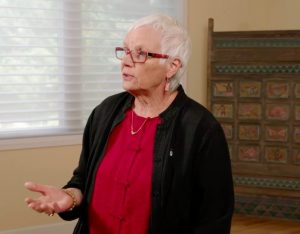
Buddhist Acharya Judith Lief has never not questioned faith.
“I find questions more interesting than answers,” Lief said. “Questions open things up while answers close things in.”
In her lecture “Human Longing and the Search for Meaning,” Lief spoke on the importance of investigating what it means to practice a religion and what it means to navigate spirituality outside of a religion. The lecture was broadcast on the CHQ Assembly Video Platform, as part of Week Two’s Interfaith Lecture Series theme, “Forces that Shape Our Daily Lives: The Contemporary Search for Spirituality.” The lecture was recorded in Lief’s Colorado home on June 28, but upon its release at 2 p.m. EDT Tuesday, July 7, the audience submitted questions for the live Q-and-A at www.questions.chq.org or on Twitter with #CHQ2020.
Lief said those who leave or do not practice religion — a rising trend — do not lack spirituality, but want to find it outside of an institution.
“What is mainstream?” Lief said. And what does it mean to be part of a group in the mainstream?
Not all religions are in decline. While forms of Christianity have struggled with retention, religions that have been introduced later into the United States, like Islam and Buddhism, are on the rise.
Lief said before religions became institutionalized, they were loose groups of people — often disenfranchised — who had dropped out of mainstream options, both religious and secular, to follow prophets addressing human questions like, “What is suffering?”
Prophets and followers alike had to overcome daily challenges and invest their time to search for wisdom and understanding.
“I think that all humans have a longing for something meaningful,” Lief said.
In Buddhism, all living things have an inner spark or a longing to develop, grow and learn — a “tenderness, a quivering suspicion” that something is beyond the superficial level within our lives, which prods us to do things that nurture growth.
Lief said this search takes many forms, and religion is just one way to do that.
Her personal journey before she reached Buddhism started in a casually Protestant family and congregation. But religious leaders did not provide sufficient answers to her questions, and she looked into the studies of other religions.
“The more questions I asked, the more personally I took a spiritual search,” Lief said. “There was a lot of empty talk, and a sense of patterned answers.”
Her dissatisfaction took place at the same time as the anti-war movement in the 1960s. An experience with psychedelic drugs reinforced her questions. She was involved in religious groups that either disconnected from the historic reality of the time, or engaged in social action without spiritual depth.
Even in groups with “just” causes, Lief observed that these groups were still based in a form of aggression, and power that was a mirror image of the side they were fighting against — which she felt was full of ego and jostling for power.
Lief said her disillusionment was healthy, because it removed her from complacency.
She discovered Buddhism by accident and found that spirituality is about uncovering a deeper understanding on one’s own.
“Spirituality is not about learning new stuff,” Lief said. “It’s about, ‘What is personally meaningful to me?’”
Some of Lief’s questions go unanswered in meditation, but that’s part of why it’s important. From meditation, she learned that wisdom does not come from running around and finding answers, but from stopping and sitting with questions.
She felt that no one had made the link to what Lief felt was a “wellspring” of human potential and wisdom, but meditation did. It was a glimpse of what everyone seeks, already within.
Anyone can possess this “simple, immediate, wholesome” state, Lief said, whether or not it is through religion. The trouble with studying religious texts, she said, is that they don’t always connect with real-life experiences.
“This way, you don’t really need to examine yourself,” Lief said.
She quoted writer Rabbi Rami Shapiro’s idea of some religions being “healthy” while some are “not healthy.” Healthy religions keep an open door to access outside religions.
Religions that are unhealthy become caught in power, money and fear of the other. They are threatened by questions and are unwilling to change over time.
Lief said institutions can positively impact people, but they need to be able to change and adapt with integrity, without being frozen in place.
“They need to pass on a living flame, rather than a relic,” Lief said.
Spirituality on its own, however, can have a superficial quality, Lief said. When spiritual experiences become a public merit badge, spirituality becomes tainted because it is meant to be an intimate experience.
Religion has potential for insights and good experiences, with a lifetime commitment to open one’s heart beyond a person’s individual ego to community. But Lief said the rise in suspicion of religion has to do with the close-minded elements of its messages. And giving oneself a religious label can become an embellishment to a sense of self, Lief said. It co-opts the ego and makes a person need to feel special to feel OK.
“Religion is presented as above the fray,” Lief said, but it’s just one part of a human experience.
The search to know is what is important, Lief said — while connecting through that search to the wonder of a beginner, even if someone becomes an expert.
Lief said that meditation reconnects to the beginner’s mind, and helps access a wellspring of shared human inspiration and potential.
She cited a Zen concept of shoshin as described by Zen teacher Shunryu Suzuki to explain this.
“In the beginner’s mind, there are many possibilities,” Suzuki wrote. “But in the expert’s, there are few.”




